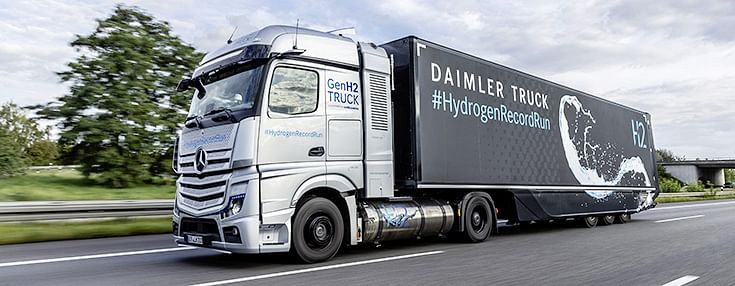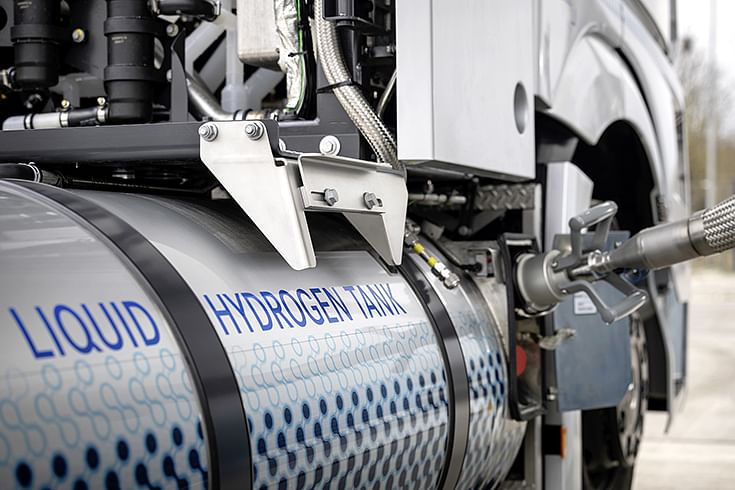Daimler Truck receives 226 million euro government funding for fuel cell trucks
The funding is part of the Important Project of Common European Interest (IPCEI) Hydrogen program of the European Union. The fuel cell trucks are to be built at the Mercedes-Benz plant in Wörth and are expected to go into operation at various customers from the end of 2026 onwards.
The Federal Ministry for Digital and Transport (BMDV) and the federal states of Baden-Württemberg and Rhineland-Palatinate have approved funding totalling 226 million euros (Rs 1,986 crore) for the development, small-series production and customer deployment (operation and maintenance) of 100 fuel cell trucks. The application had been subject to extensive review, also by the European Commission.
Karin Radstrom, CEO of Daimler Truck, said: “The approval of funding for the development and small series production of 100 fuel cell trucks is an important boost for the use of hydrogen in road freight transportation. This funding is therefore a strong signal not only for Daimler Truck but for the entire commercial vehicle industry.”
Dr. Volker Wissing, Federal Minister for Digital and Transport and Federal Minister of Justice: “Sustainable transportation with hydrogen-powered trucks is already possible today. Daimler Truck is the first European manufacturer to produce a series-production truck that uses liquid hydrogen – and thus provide an important impulse for the commercial use of hydrogen technology in road freight transportation. I am pleased that my ministry is supporting the project together with Baden-Württemberg and Rhineland-Palatinate with a total of 226 million euros. With the deployment of the new fuel cell trucks, we are gaining important insights for the future mix of drive technologies enabling sustainable freight transport.”
On the path to decarbonize transportation with hydrogen-powered trucks, Daimler Truck had filed an application for funding in 2021 for the development of fuel cell trucks and small series customer deployment in long-distance transportation. Daimler Truck will now receive around two-thirds of the total eligible amount put forward in the IPCEI-funding application. Daimler Truck will continue to carry a significant part of the total investment in the development of fuel cell trucks on its own.

The funding project, created within the framework of the European Union’s IPCEI (Important Project of Common European Interest) Hydrogen program, covers both vehicle and production-related activities. In addition to the development and build-up of the vehicles, the funding will also be used for feasibility studies with regard to the hydrogen value chain as well as investments in required production facilities and processes in preparation for planned series production.
Key components are set to be assembled at various German production sites and made available for final assembly. Kassel (electric drive axle) and Mannheim (‘Tech Tower’) are two of the involved plants, while the fuel cells are planned to come from cellcentric’s pilot production in Esslingen and are set to be assembled into a twin-system at the Gaggenau plant. Final assembly of the next generation fuel cell trucks is set to take place at the Mercedes-Benz plant in Wörth and the trucks are expected to go into operation at various customers from the end of 2026 onwards.

Liquid hydrogen enables a range of 1,000 kilometres and more
In their funding assessment, the European Commission identified at an early stage that there was no comparable venture to this project’s deployment of liquid hydrogen, which was positively highlighted within the scope of the IPCEI criteria. In its liquid aggregate state, the energy carrier has a significantly higher energy density in comparison to gaseous hydrogen. This means that more hydrogen can be transported, significantly increasing the range and ultimately enabling comparable performance to a conventional diesel truck.
In addition, transportation efforts can be significantly reduced with liquid hydrogen. Moreover, liquid hydrogen tanks offer cost and weight advantages compared to compressed gaseous hydrogen. Thus, the use of liquid hydrogen enables a higher payload, among other benefits. This makes the Mercedes-Benz GenH2 Truck just as suitable for flexible and demanding long-haul road transportation as conventional diesel trucks.
In September 2023, Daimler Truck successfully demonstrated this, when a public road approved prototype of the Mercedes-Benz GenH2 Truck completed the #HydrogenRecordRun, covering 1,047 km with one tank filling of liquid hydrogen on board. The fuel cell trucks funded under the IPCEI are set to enter customer operations with this tried-and-tested liquid hydrogen technology.
Dual-track strategy with hydrogen and battery-powered vehicles
As one of the world’s largest commercial vehicle manufacturers, Daimler Truck has committed itself to the Paris Climate Protection Agreement. The objective is to offer only new vehicles that are CO2-neutral in driving operation in its global core markets (Europe, USA, Japan) by 2039.
Battery-electric trucks are the ideal choice for distribution haulage and, in the case of the Mercedes-Benz eActros 600, for long-distance haulage with regular deployment on plannable routes with suitable distances and charging options. Trucks with fuel cells can be a better solution especially for very flexible and particularly demanding deployments in heavy-duty transportation and long-distance haulage. In addition, the availability of appropriate infrastructure and sufficient green electricity are crucial for a successful transition to CO2-neutral technologies. Daimler Truck is convinced that rapid and cost-improved coverage of this energy demand can only be achieved with both technologies.
ALSO READ: Daimler Trucks begins customer trials with Mercedes-Benz GenH2 trucks
RELATED ARTICLES
Autoliv Plans JV for Advanced Safety Electronics With China’s HSAE
The new joint venture, which is to be located strategically near Shanghai and close to several existing Autoliv sites in...
JLR to Restart Production Over a Month After September Hacking
Manufacturing operations at the Tata Group-owned British luxury car and SUV manufacturer were shut down following a cybe...
BYD UK Sales Jump 880% in September to 11,271 units
Sales record sets the UK apart as the largest international market for BYD outside of China for the first time. The Seal...






 By Autocar Professional Bureau
By Autocar Professional Bureau
 19 Nov 2024
19 Nov 2024
 5302 Views
5302 Views





 Ajit Dalvi
Ajit Dalvi




